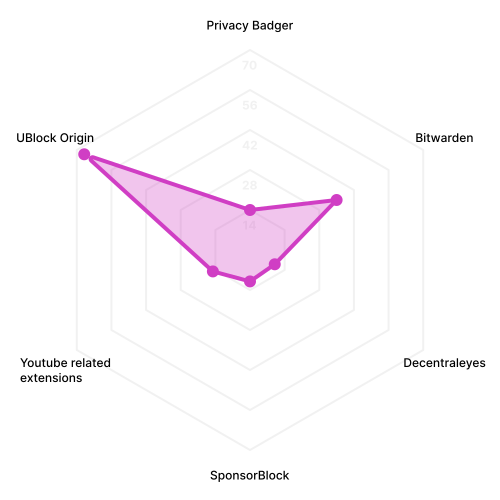2023-10-31, updated: 2024-03-12
Browser Extension Usage in Primates
Browser Extension Behaviors
Wild tool use in primates is a known phenomenon, yet remains poorly documented to this day. Like the great apes of central Africa, which are known to fashion tools for foraging and self-defense, the computer programmer maintains a collection of tools and practices for their daily survival. One of these important tools is the Internet browser and its associated extensions.
A survey was conducted to understand the browser extension behaviors of this wild population and the results are presented here.
Context, purpose
Work continues to build a web browser to meet the needs and expectations of online researchers, and code-proficient computer users. This survey was conducted to help characterize the unmet needs of that group and "Must have" user requirements in the new Internet environment.
Extension support for Nyxt is an ongoing development project and my hope is that these responses help to clarify the scope for our team of contributors. In my view, browser extensions represent features of significant importance to users who care enough to take extra steps to ensure that their browsing experience includes those features. Actions speak louder than words, and these are the actions.
To further this understanding, respondents were asked about browsing behaviors OUTSIDE the Nyxt environment, to help determine which features merit enough attention to bring into the fold.
voracity and sample population characteristics
- n = 100 → so don't go making assumptions about the global population.
- This group is primarily computer scientists, researchers, information security professionals, and productivity hackers. Retired computer enthusiasts are also represented.
- This cohort was recruited from the Nyxt mailing list, and secondarily from forum posts related to the same application. So, we infer a sufficient level of interest in our success for productive responses, and hope that we can build useful tools for the population approximated by this sample group.
Findings

- Adblocking extensions are more common than any other group. Ublock Origin is mentioned by 67 of 100 respondents in the sample population.
- Password management (auto-fill) extensions are significant, and need to be considered. Bitwarden is the second most mentioned extension, and respondents tended to use importance modifiers like "MUST HAVE, my whole online life is on there" when describing both Bitwarden, and similar extensions such as 1Password.
- Many responses have to do with YouTube and video display. Some participants who mention YouTube suggest a tall stack of related extensions. Mostly about advert avoidance, some about play speed, or content moderation. I get the sense that people want more control over the feed. The extension Return YouTube Dislike was mentioned 7 times, and extensions similar to Enhancer for YouTube were mentioned about 10 times. "if browsing YouTube would be possible that would be great" -anonymous
- One thing you don’t see, but I can tell you, is that respondents did show interest in the extension NoScript. This extension does not fit nicely in our analysis as some users have other ways to deactivate JavaScript in browsers and Nyxt already does this with `no-script` mode.
Good luck out there my friends with computers and sincerely thank you again to any research participants.
Did you enjoy this article? Register for our newsletter to receive the latest hacker news from the world of Lisp and browsers!
- Maximum one email per month
- Unsubscribe at any time
